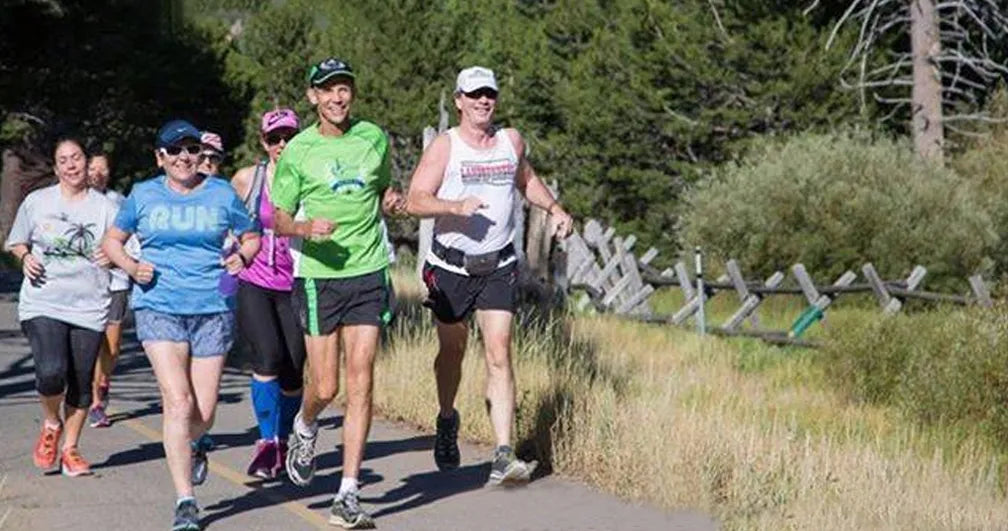
An Olympian at 80: Jeff Galloway Speaks
Share
Ready to Run had the opportunity to catch up with Olympian/coach/athlete/author Jeff Galloway this past week and here’s what Jeff, who competed in the 10,000 meters in the 1972 Olympics had to say.
RTR: You just turned 80 a few days ago. How do you feel?
JG: I feel absolutely great. My life is really great. I continue to coach in person and online. And we’re now building a corporate app. The running can be tough. As many people know, I had a heart attack four years ago. What they may not know is that it was due to agent orange exposure in Vietnam when I was in the Navy. I was on two tours — one in 1967–68 and one in the fall of 1968–69. My doctors told me that had I not been a lifelong runner, I would have had died from the heart attack. I survived because of my running. I now have five stents and a pacemaker/defibrillator. So I can run, just slow.
RTR: What have you learned from adverse events as you get older?
JG: My gut reaction is that it’s not what happens to you, it’s what you do after something bad happens. The most important part is the mental aspect. You need a mental strategy. You need to manage your setbacks. And of course, exercise is the most powerful way to engage the positive hormones in your brain.
RTR: What’s your schedule like these days?
JG: Going to races got squelched because of Covid and didn’t really return in the same way. So I now don’t travel as much, which has turned out to be a blessing. I’ve developed apps like the walk/run app. My son has helped build those. I’m in the Florida panhandle now. We still have our training programs around and we still do our retreats. I show up for all six of the Disney races. We supply the pace groups for them. At the Disney expos, people line up and tell me how much I’ve improved the quality of their lives with the run/walk/run method.
RTR: What does your daily exercise routine now involve?
JG: I run usually every other day. I walk on most of my off days. On my running days, I’ll do three to five miles. But I’ve scheduled my next marathon! I’ll be running the Honolulu Marathon on December 14 of this year. My long run is up to 13 miles and I plan to increase it up to 28 miles. Alot of history there: I won the race in 1974. And my wife and I got engaged there.
RTR: Former marathon champions Bill Rodgers and Frank Shorter recently said they now run/walk/run. Any thoughts?
JG: My PR in Houston in 1980 is 2:16:35. During that race I’d walk for about 10 seconds at every water break. What (Harvard Professor of Human Evolutionary Biology) Daniel Lieberman says it that our ancestors didn’t run continuously — they walked/ran. We were not designed for running nonstop long distances. So our ancestors only ran when they had to. Run/walk/run is made for mature people because as you lose your muscle strength, if run non-stop, you’ll fatigue earlier and burn out.
RTR: In a sense, isn’t the run/walk/run method kind of like intervals without the speed?
JG: Yes, it is.
RTR: When barefoot running and minimalist shoes were the rage, you remarked that you’d seen running shoe trends come and go. Now we have the big-foam style shoes. Do you think those will stay?
JG: Shoes now look spongier than they really are. The shoe companies have really done a great job evolving the shoes. So there’ll be categories for major and medium cushioning, with the other 15 to 20 percent more in between.
RTR: There seems to be valid data suggesting that super shoes do indeed equate to faster race times. Your take?
JG: I truly believe that the super shoe mechanics are quite good and that the studies are legitimate. One possible downside is our feet aren’t designed to handle the mechanics of those super shoes, which could lead to more injuries. So use them judiciously.
RTR: Do you think if you ran in super shoes back in the day, you’d have run faster than 2:16:35 for the marathon or 47:49 for 10 miles?
JG: I think I would have run faster. But I don’t know if my feet would have been able to handle the mechanics of those shoes.
Upcoming races: Saturday, July 20, the US 5K/10K/Half Marathon at 8:00 a.m. at Bohls Park in Pflugerville. Sunday, July 27, the Marble Falls Triathlon at 7:00 a.m. at Lake Marble Falls. (Intermediate Distance: 1km swim, 16 mile bike, 4.4 mile run • Sprint Distance: 500m swim, 12 mile bike, 2.2. mile run). Saturday, August 2, the Summer Meltdown Half Marathon at 7:00 a.m. at Lake Pflugerville Park.
